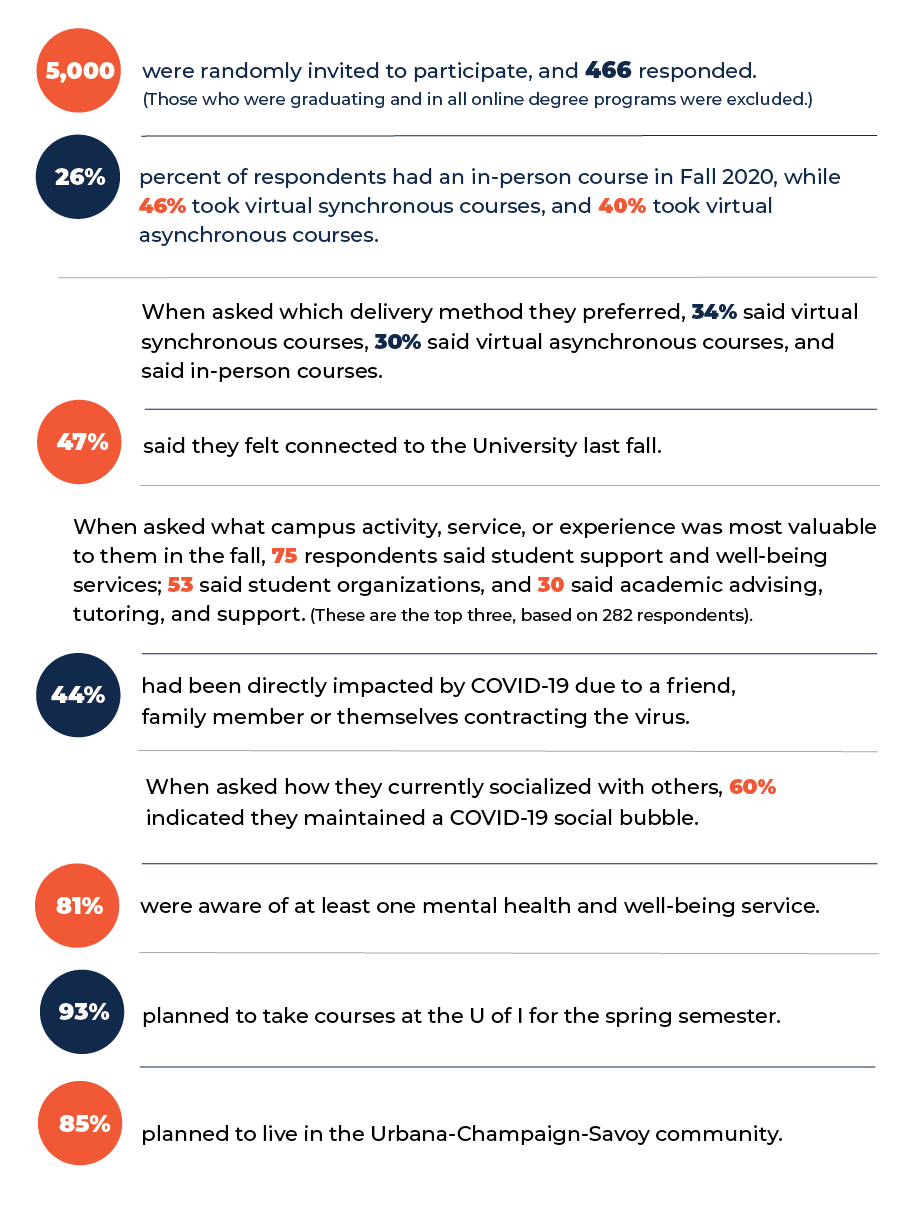
Last fall, campus officials conducted a survey asking students about their learning experiences in the Fall 2020 semester – and their feelings about Spring 2021. Students offered valuable feedback.
“Be more mindful of overall workload,” one respondent wrote. “I think there are some instructors who assigned more work due to the virtual format.”
“Easier access to lecture materials, quicker response time to emails, more supporting material like worksheets and study guides,” another suggested.
“There being less restrictions than in the fall. I wanna see my friends!” another respondent offered, referring to something many said they were looking forward to.
The feedback was compiled in the Fall 2020 Student Experience Survey. Now school officials, faculty, and staff are using it to improve students’ on-campus and online experiences this semester and going forward.
Students ask for more support, flexibility
When asked what faculty/instructors could do to support you in the spring, students’ responses were:
1. Be mindful of their workload and flexibility with deadlines. According to the report, students expressed a desire for instructors to be more cognizant of the workload assigned. Many indicated they were getting more “busy work” with online learning. Increase flexibility with deadlines and technical challenges was a prominent concern. This theme also included increased student check-ins and extra credit options.
2. Offer more office hours and resources. Students asked for more office hours and instructors to be more accessible virtually. Respondents also asked for additional resources to be posted online. Capitalize on virtual instructional methods. Students encouraged instructors to utilize more virtual tools and increase engagement strategies. Many respondents described a need for more virtual engagement with instructors, having videos on during synchronous learning, captions for videos, using polling, and worksheets.
3. Offer more in-person classes/sessions. Offering more in-person courses or sessions (including class sessions, labs, and study groups) was a recurring theme.
4. Clear scheduled, deadlines, and expectations. Students expressed the need for clear deadlines and a detailed calendar (e.g. Compass calendar). Others expressed a need for more reminders due to changing priorities or deadlines throughout the course.
5. More asynchronous/recorded lectures. Respondents asked for lectures to be recorded and available after the course session. Some students encouraged more asynchronous courses due to time zones or personal schedules.
6. Improved exams/test-taking. Students asked for more flexibility in test-taking and the elimination of proctored tests (e.g. Proctorio). Suggestions included more take-home exam formats, longer times to complete, and a reduction in the number of tests.
7. Several students expressed appreciation for their instructors who have been approachable, accessible, and doing the best they can given the circumstances.
Others offered a wide variety of suggestions including: the university provide all students with high-speed internet, adding more library hours, taking steps to eliminate Zoom bombing, allowing guests in residence halls, and reducing tuition for out-of-state students, if they were required to be fully online.
Looking forward to Spring 2021
At the time of the survey, students indicated they had a mix of feelings – hope, uncertainty, anxiousness – for the spring. They were split on how they wanted services and events delivered – virtually or in person. About half said they were comfortable with in-person experiences, but those varied by type. They also indicated they were socializing primarily in “COVID bubble,” and their top barriers to engagement were fear of getting/spreading COVID, unable to connect virtually, and lack of energy.
When asked what they were most concerned about, students cited: their academic courses, the format, and their performance; COVID-19 health and safety; their mental health, including feelings of loneliness and isolation, and not having a spring break. They also cited concerns over making rent and other financial concerns and a lack of social interaction with fellow students and professors or being able to engage in social activities.
But they also expressed excitement about taking a new set of courses, graduating and hitting other academic milestones (e.g., ABD, thesis, dissertation), and completing the academic semester and year. They were also looking forward to physically being on campus, participating in on-campus activities and events, socializing with friends and meeting new people, and getting “back to normal.”
The survey also touched on students’ health and well-being, including what mental-health services they were aware of, how they socialized, and how connected they felt to the university. Graduate students felt more connected than undergraduates, and first-generation students felt less connected than non-first-generation.
Some of their most valuable experiences:
“In person lab made things seem more normal and helped maintain a routine,” a respondent said.
“I loved talking to my OMSA advisor,” another offered.
“I would not have been able to pursue my degree this semester without online resources (articles, databases, etc.) There is no way I could afford to buy access to every reading for my classes,” yet another respondent said, referring to student support and well-being services.
Students offered ample suggestions for improving connectedness, both academic and non-academic. Suggestions included having in-person/social distanced indoor and outdoor events, more in-person classes/study groups, and the opening of facilities for students to gather and study in small groups, and online/virtual events including Among Us tournaments and other gaming activities, meet-ups, and study groups. Others indicated they were unsure of how to increase connections, and a few said they felt like the university was doing what it could.
What was your Fall 2020 experience like? What are things your instructors and campus officials can do to improve your experience -- academic, social, and health and safety -- this semester? We'd love to hear from you!